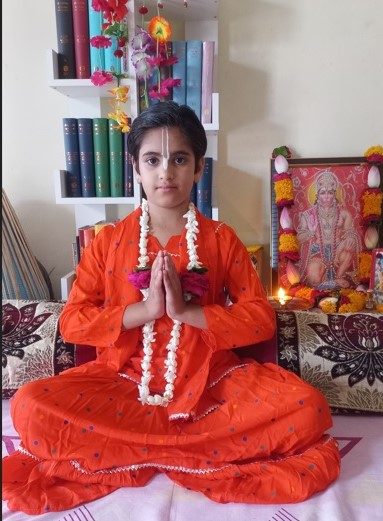Today, we begin a journey to understand the importance of Bhakti in our lives. Bhakti, often defined as the path of devotion, leads us on a spiritual journey encompassing elements such as knowledge, detachment, and the quest for the state of “Parmanand.” Within this journey, we discover Krishna as the embodiment of “Param Chetan” and draw inspiration from inspiring devotees like Dhruv and Prahlad Maharaj. Moreover, we explore the dual aspects of God, encompassing both the formless “Nirakar” and the personal “Sakar” manifestations.
Bhakti, Knowledge, and Detachment
At the core of Bhakti lies a harmonious fusion of knowledge and detachment. It serves as a vehicle for seeking profound wisdom and insight into the divine. Simultaneously, it encourages detachment from material attachments, liberating the soul to concentrate on the eternal. This synthesis of knowledge and detachment defines Bhakti, offering a path toward spiritual growth, self-realization, and a more profound connection with the divine.
The State of “Parmanand (Complete happiness)” and Krishna as “Param Chetan (Supreme Consciousness)”
On the path of Bhakti, we ascend towards the state of “Parmanand,” a transcendent joy experienced through unwavering devotion. It represents a great connection with the divine source, with Krishna representing “Param Chetan,” the supreme consciousness, as expounded in the Bhagavad Gita. His teachings guide us towards self-realization and the eternal joy of “Parmanand.”
Inspiring Devotees: Dhruv and Prahlad Maharaj
The stories of devoted souls like Dhruv and Prahlad Maharaj illuminate the path of Bhakti, serving as inspiring examples of unwavering faith and spiritual resilience. Dhruv’s remarkable journey was characterized by his steadfast devotion, which propelled him to a higher spiritual realm. His unwavering determination and deep connection with the divine transformed him into a shining star in the cosmos, symbolizing spiritual ascension.
On the other hand, Prahlad Maharaj’s unwavering devotion to Lord Narasimha stands as a testament to the solace and strength that Bhakti can provide, even in the face of extreme adversity. Despite enduring countless trials and tribulations, his unyielding faith remained unshaken. His story exemplifies the remarkable power of Bhakti to offer solace, protection, and unwavering support, even in the darkest of times.
These tales underscore the transformative potential of Bhakti, revealing that it has the capacity to lift individuals to extraordinary heights and provide boundless grace to those who embrace it with unwavering faith. Dhruv and Prahlad’s stories continue to inspire countless seekers on their spiritual journeys, illustrating the profound impact of devotion and steadfast belief in the divine.
Formless (Nirakar) and Personal Forms (Sakar) of God
Bhakti allows us to explore both the formless and personal aspects of God, accommodating the diverse spiritual needs of individuals. While some prefer a formless, abstract connection with the divine, others find solace and depth in personal deities with specific attributes. The formless concept, or “Nirakar,” offers a universal, all-encompassing divine presence. In contrast, the personal forms, or “Sakar,” provide a relatable and emotional connection to God. Both perspectives are embraced, demonstrating the inclusivity of Bhakti. Devotees who pray to God in a personal form are highly revered and considered “paramsidh” or especially pious in many religious traditions.
The Universality of Bhakti
Bhakti transcends cultural and religious boundaries, emphasizing unity and tolerance in a world often marked by religious conflicts. It serves as a unifying force, promoting mutual respect and understanding. Bhakti emphasizes that love and devotion are the threads that bind humanity together, regardless of creed or background. It offers a spiritual framework that accommodates various beliefs and practices while advancing a sense of compassion and empathy for all living beings.
Conclusion
In conclusion, Bhakti, the path of devotion, is a powerful journey that integrates knowledge, detachment, and the pursuit of “Parmanand.” Krishna embodies “Param Chetan,” guiding us toward self-realization. The inspiring tales of dedicated individuals, combined with the harmonious acceptance of both formless and personal concepts of God, underscore Bhakti’s universal and transformative nature, demonstrating its broad appeal and profound power in spiritual journeys.
